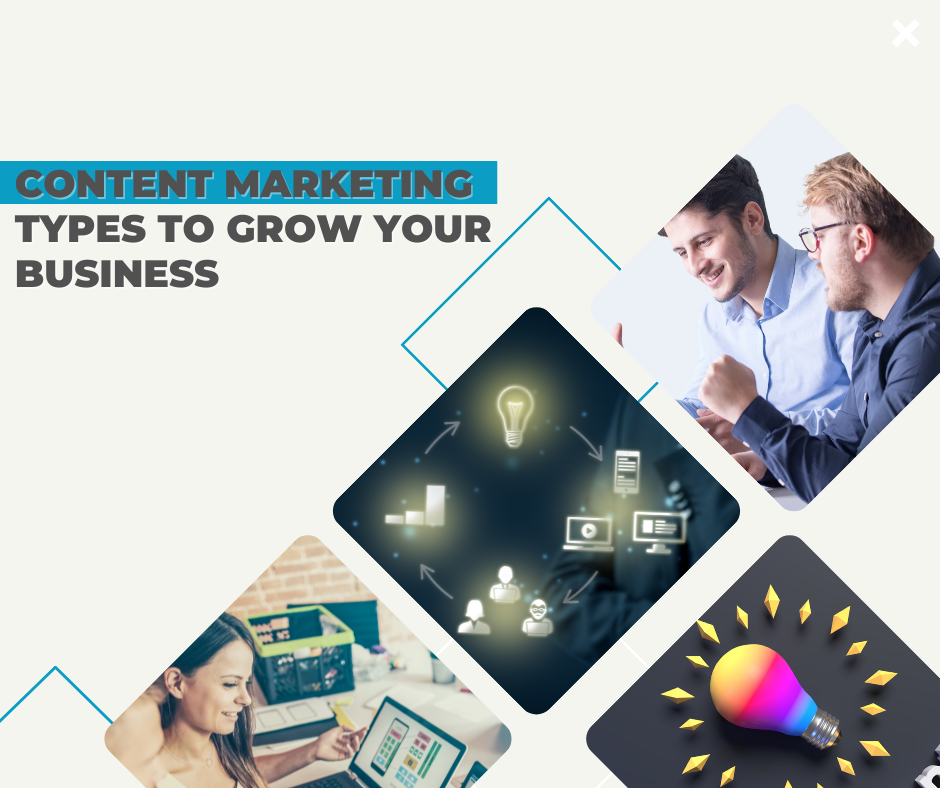Content Marketing Types To Grow Your Business

Content marketing can help your business reach your intended audience by promoting authentic and valuable content — that solves their pain points and instills a sense of trust in your brand.
The content that your brand promotes needs to feel organic and natural — instead disruptive. When you disrupt potential clients or customers, they immediately view it as an annoyance instead of a value-add offer.
Read on to learn more about the various types of content marketing and how to make your content more authentic and engaging — while driving more leads and sales to your business.
What Is Content Marketing?
Content marketing is often used as a catch-all phrase that describes the process of attracting, engaging with, and thrilling your target markets. The content that you create needs to reach your audience in a way that feels natural.
One of the best ways to do this is to create an overarching narrative that tells a story. This will allow your content to feel engaging, authentic, and tailored to your intended audience.
So, what is content marketing exactly?
Content marketing is the process of planning, creating, distributing, sharing, and publishing content through a wide variety of channels such as social media, websites, blogs, podcasts, email blasts, press releases, and print publications (e.g., “sell sheets”).
The end goal of content marketing is to increase brand awareness, engagements, leads, sales, and loyalty.
Types of Content Marketing
There are many different types of content marketing that you can use to engage your audience:
Blogs
Blogs are a natural way of getting your message out there. The search engines can pick up your blog posts and send free traffic to your website—traffic that has a pain point that your products or services can solve. You can also promote your blog posts on your social media channels and email blasts.In progress
Infographics
Infographics are a powerful way of visually selling your products or services, and they offer easy-to-understand data in a graphical format. They’re ideal for educating your audience or breaking down complex topics into simple terms.
Social Media
Facebook, Twitter, and Instagram are just a few of the many social media platforms you can use to promote your business. In addition to sharing written content, you can also share live or pre-recorded videos, photos, and stories.
Podcasts
A recent survey found that around 49% of 12-to-32-year-olds listen to at least one podcast every month, with six hours listened per week. Many businesses are now creating podcasts to capture the attention of this massive audience.
Paid Ads
Paid ads work exceptionally well. You can have your ads shown on various online places such as Facebook, Twitter, Instagram, and Google/Bing search results (including their partner websites).
Video
Video content marketing is a powerful way of getting your brand message across to a broad audience. A survey found that around 69% of consumers prefer to learn about a brand’s service or products through video.
The Power of Storytelling
When trying to sell your product or service, you may immediately default to promoting stats and figures. Many studies have shown facts and numbers by themselves aren’t enough to persuade someone to buy your product or service.
Emotion makes people take action—and emotion comes from storytelling. Since the days of our ancient ancestors sitting around an open fire, storytelling has been a way to relate important information to friends, family, and other people.
So what exactly is storytelling as it pertains to content marketing?
At its most basic level, storytelling tells a story (whether real or fictional) that shares a message with your audience. Good storytelling is engaging, emotional, and inspires the reader or listener to take action.
At its most advanced level, storytelling is both a science and an art, and it can take years or even decades to master. Great storytelling identifies the correct message and executes it so that it elicits the desired emotional response from the reader.
Benefits of Storytelling
When done correctly, great storytelling can:
- Grow brand awareness and loyalty
- Make your brand seem more human and less corporate
- Allow you to strengthen the connection between your audience and your brand
- Persuade people to take action (“buy now,” “click here,” “call us for more information,” etc.)
Example of Storytelling in Content Marketing
AirBnB, an online marketplace for lodging, put out an excellent series of storytelling videos to promote their new service. Here’s one great example:
The above video promotes a new AirBnB service that allows guests to cook native foods with the house owner. Instead of hiring paid actors or using company talking heads, AirBnB uses real-life hosts who tell their stories. The end result is a powerful storytelling tool that gives off the impression that renting an AirBnB and cooking dinner with locals is a unique experience.
Content Marketing Help
When combined with storytelling, content marketing is an excellent and persuasive way to organically promote your brand while driving new sales and customers through your front door.
The Witmer Group has been helping businesses with their marketing for over ten years. We offer a wide range of digital marketing solutions and can create a customized marketing strategy to help your business remain competitive.Call us today at (214) 865-9484, or contact us via our website to learn more about the various marketing and data analytics services we offer our Dallas clients.


